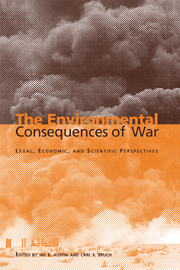Book contents
- Frontmatter
- Contents
- List of illustrations
- List of tables
- List of contributors
- Acknowledgements
- Foreword by Klaus Toepfer
- Introduction
- Part I General principles
- Part II The legal framework
- Introduction
- 2 The law of war and environmental damage
- 3 War and the environment: fault lines in the prescriptive landscape
- 4 The inadequacy of the existing legal approach to environmental protection in wartime
- 5 United States Navy development of operational-environmental doctrine
- 6 In furtherance of environmental guidelines for armed forces during peace and war
- Introduction
- 7 Peacetime environmental law as a basis of state responsibility for environmental damage caused by war
- 8 Environmental damages under the Law of the Sea Convention
- 9 The place of the environment in international tribunals
- 10 Civil liability for war-caused environmental damage: models from United States law
- Part III Assessing the impacts – scientific methods and issues
- Part IV Valuing the impacts – economic methods and issues
- Part V Prospects for the future
- Index
8 - Environmental damages under the Law of the Sea Convention
Published online by Cambridge University Press: 04 August 2010
- Frontmatter
- Contents
- List of illustrations
- List of tables
- List of contributors
- Acknowledgements
- Foreword by Klaus Toepfer
- Introduction
- Part I General principles
- Part II The legal framework
- Introduction
- 2 The law of war and environmental damage
- 3 War and the environment: fault lines in the prescriptive landscape
- 4 The inadequacy of the existing legal approach to environmental protection in wartime
- 5 United States Navy development of operational-environmental doctrine
- 6 In furtherance of environmental guidelines for armed forces during peace and war
- Introduction
- 7 Peacetime environmental law as a basis of state responsibility for environmental damage caused by war
- 8 Environmental damages under the Law of the Sea Convention
- 9 The place of the environment in international tribunals
- 10 Civil liability for war-caused environmental damage: models from United States law
- Part III Assessing the impacts – scientific methods and issues
- Part IV Valuing the impacts – economic methods and issues
- Part V Prospects for the future
- Index
Summary
Introduction
The principle that a state is responsible for environmental damage attributable to it is well established in international law. Both the Stockholm Declaration of the 1972 UN Conference on the Human Environment and the Rio Declaration of the 1992 Conference on Environment and Development contain clear statements on the obligation of states to ensure that activities undertaken by them or under their jurisdiction do not cause damage outside their areas of jurisdiction. There is ample case law in the jurisprudence of international judicial bodies and arbitral tribunals to support the proposition that a state can be held responsible for, and be liable to pay compensation or make other appropriate reparation for, damage that results from its failure to fulfill its obligations in respect of activities undertaken by it or on its behalf or within its jurisdiction. A state that suffers damage as the result of an act or omission of another state contrary to international or national law may bring a claim for compensation against the offending state.
A court or arbitral tribunal that is seised of a claim from one state for compensation for environmental damage against another state will normally be competent to deal with all aspects thereof, including the existence or otherwise of liability, the basis of such liability (including any exonerations), the extent of the damage attributable to the state alleged to be liable, and the quantum of compensation to be paid, having regard to the circumstances of the case.
- Type
- Chapter
- Information
- The Environmental Consequences of WarLegal, Economic, and Scientific Perspectives, pp. 226 - 249Publisher: Cambridge University PressPrint publication year: 2000
- 1
- Cited by



